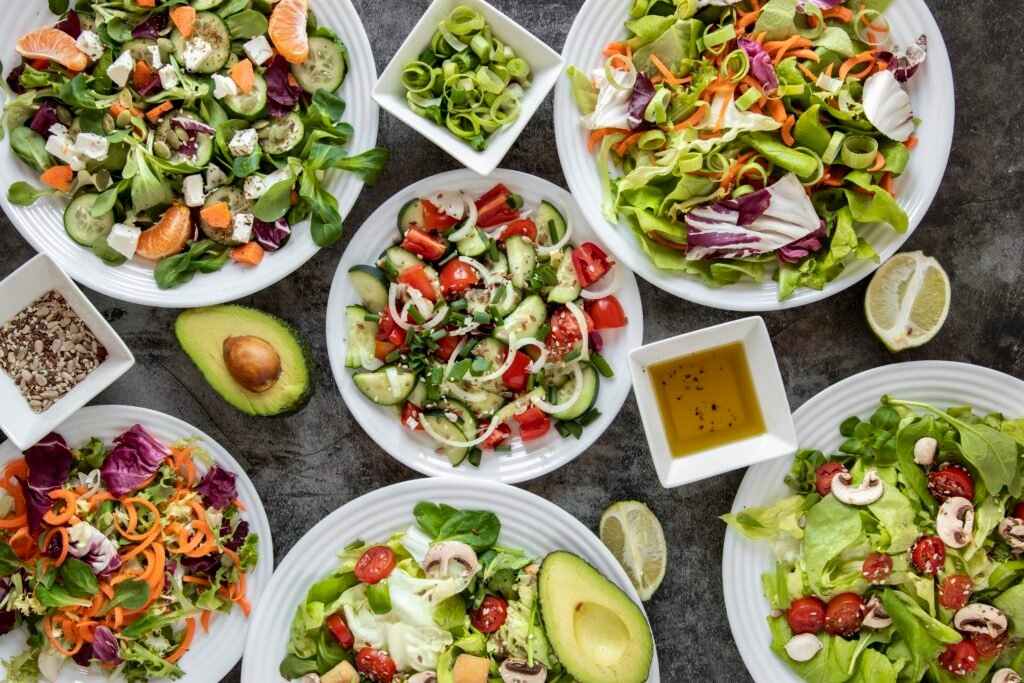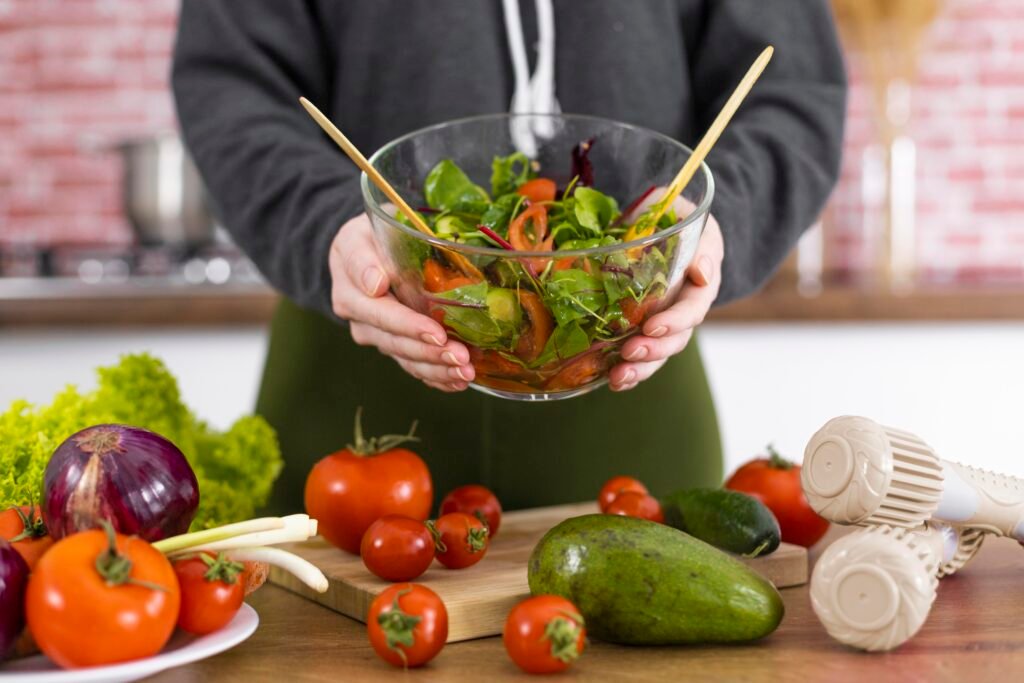Table of Contents

Introduction to the World of Salad Secrets
In this blog, we will learn about salad secrets. For centuries, salads have been part of the eating habits of the health-conscious, the casual cook, and anyone eager to enhance their nutrition. However, how healthy are salads, really? The answer is a resounding affirmative! The current blog post will elucidate the reasons why salads form a fundamental part of healthy diets and how they can be delicious inclusions in a meal plan.
This guide is about the various advantages of salads that is actually salad secrets have to people, be they avid fans of salads or those who are trying healthy eating for the first time. It will include the salads themselves, how to make appetizing and healthful salads, and the like as well as the most frequently asked questions concerning the cultures of eating salads.
Nutritional Benefits of Salad secrets

Nutritional benefits of salad are also called salad secrets here are some salad secrets as follows:
High in Essential Vitamins and Minerals
A salad is an excellent way to get vitamins and minerals. Consequently, feeding the body is essential. For example, vegetables such as spinach and kale are rich in vitamin K. Promotes bone health: Vegetables such as tomatoes, ice cream, bell peppers, and carrot slices are rich in vitamin C. which helps boost the body's immune system Eating salads composed of numerous vegetables guarantees a wide range of nutrients in all the bites.
Rich in Fiber for Digestive Health
A high content of fiber is one of the exemplary features of salads. It is known that such dietary factors as fiber improve the functions of the digestive system and promote regularity. On top of that, the consumption of salads and other fibrous foods promotes the levels of blood cholesterol and blood sugar, which are essential for health. Fiber in salads can be increased by the addition of other ingredients like beans and nuts.
Low-calorie content and effective for controlling weight.
While salads are great for anyone, they are even better for individuals who want to lose weight as they are low in calories with a high volume. This means you can fill up on salads without worrying about taking in too many calories. Therefore, these bulky food items are quite ideal for consumers who are on a diet or want to maintain a certain body weight. Salads do not have to be bland; the right ingredients and how much of each is put into the salad can make even healthy salads appetizing.
Types of Salads

Green Salads
The most widely available type of salad is green salad and this is with good reason too. Leafy vegetables including lettuce, spinach, arugula, and kale are frequently used in green salads. Although these veggies are quite low in calories, they are highly significant since they give essential elements that work wonders for salads. One may also add some vibrant-colored veggies as well to enhance the taste and nutrition as well.
Protein-Packed Salads
Protein may improve the nutritional value and structural attractiveness of salads. Foods rich in protein, including grilled chicken, lentils, beans, and tofu, may improve your diet. This boosts the necessary nutrients for muscle development and repair in addition to the taste. Salads loaded with protein are very suitable for lunch or supper.
Grain-Based Salads
Salads that include grains are a wonderful option for adding whole grains to your meals. Salads or salad alternatives with grains therefore differ in texture and consistency; a variety of quinoa, barley, and farro are common examples. These cereals are, apart from being healthy, energy-giving foods as well. Grain salads can on their own suffice as a meal, as they are carb, protein, and fat balanced.
Tips for Making Healthy Salads

Choosing the Right Ingredients
The secret to a balanced salad resides mainly in the choice of ingredients. It is advisable to use fresh seasonal vegetables and fruits as they guarantee the best taste and nutritional value. Choose organic whenever possible and have fun with combining different shapes and hues to avoid monotony in salads. Eating various kinds of vegetables makes sure that many types of nutrients are absorbed.
Creative and Healthy Salad Recipes
We're all aware that you may be as inventive as you like when it comes to salads. What about a salad that has a lot of Mediterranean components, such as cherry tomatoes, feta cheese, and olives? Or perhaps a spicy salad from Thailand with ripe mango and peanuts? You may add more flavor to your meals by experimenting with the countless options available. Never be afraid to attempt new things!
Dressing Options for Flavor without Sacrificing Health Benefits
The value of a salad solely lies in its dressing. its actually a secret of salad. Store-made salad dressings are even more convenient as they tend to have preservatives and sweeteners in them. Given that, you might want to prepare dressings from simple ingredients like olive oil, vinegar, lemon, and herbs. Simple as they may be, these dressings give flavor to your salad without introducing excess calories or chemical preservatives.
Health Considerations
Avoiding Common Salad Pitfalls
We are all know about salad secrets but in this para we will learn about avoiding common salad Pitfalls this is also a secret. Salads are healthy, but certain mistakes could compromise their health benefits. For instance, over-topping with dressing, adding calorie-dense foods like croutons, and/or processed/ unhealthy meat products should be avoided as these foods easily convert healthy salad into a fat and calorie-rich meal. Controlling portion size and using only natural foods with little to no processing should help keep the health benefits of the salad intact.
Addressing Allergies and Dietary Restrictions
It is crucial to pay attention to the items used while making a salad for someone with dietary restrictions or allergies, either for you or them. Dairy and nuts, for example, are frequent allergies. To meet the demands of everybody, always keep substitutes on hand, such as dressings without dairy or seeds in place of nuts.
FAQs

1. Am I allowed to consume salads daily?
Yes! One of the healthy practices of dieting is eating salads every day. However, you have to change the ingredients in the salad to get different vitamins.
2. Are there some sick salads in this world?
For example, overindulging in creamy sauces, fried or crunchy garnishes, or fatty meats can make certain salads unhealthy. If you are mindful of this and only use whole, unprocessed foods, your salads will be nutritious.
What are some ways to add excitement to a dull salad?
Incorporate vegetables, along with protein such as grilled chicken or beans, as well as grains like quinoa, into the salad for added substance.
Conclusion
For every person who intends to enhance their eating habits, salads are one of the healthiest and the most flexible food alternatives. They are rich in calories as they provide with enough calories in the form of vitamins, minerals, and fibers and are perfect for healthy living and weight control.
There are many types of salads, ingredients, and endless possibilities for delectable nutritious dishes. However, beware of some common mistakes, such as covering everything with unnecessary, excessive dressings and, as always, think about what can be served to whom and in what way.
Integrating additional salads into your meals is easy, yet, makes a significant contribution to healthy living. We all suggest you prepare some different salad recipes than the usual ones and post this to your friends, who would love such yummy and healthy food ideas. Make a lot of salads!
“Discover the fresh, flavorful side of fast food with a deep dive into Burger King’s salads!”
